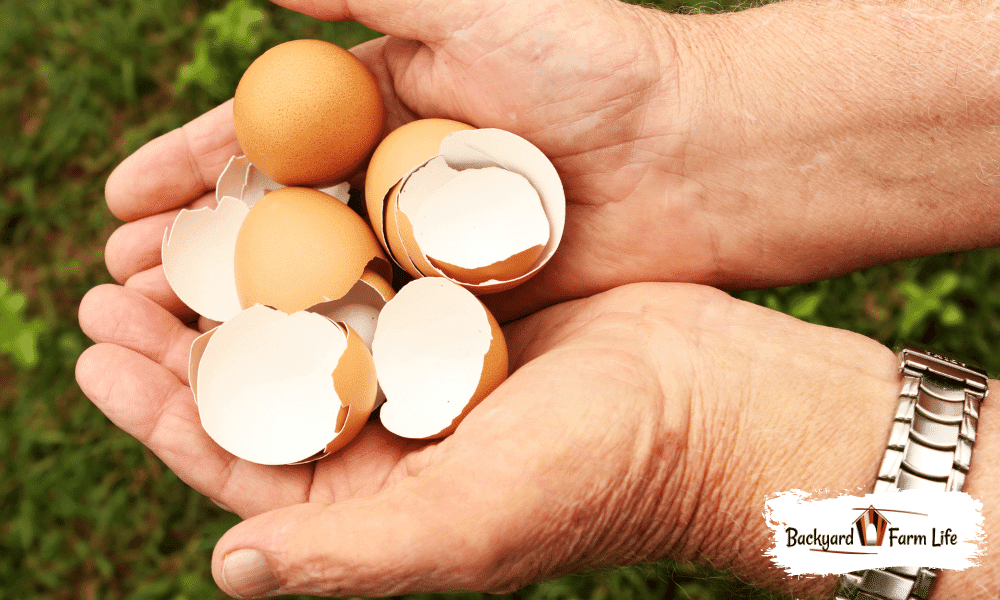If you’ve owned chickens for any amount of time you’ve problem heard of the importance of calcium for regular egg production. After all, their egg shells are literally made of it!
You might have even heard that chicken owners will purposefully feed their chooks crushed eggshell, oyster shell, or other grit.
Whether you’ve got commercial or backyard chickens, calcium is a crucial part of a chicken’s diet. But it is possible for your chickens to actually have too much?
Here’s whether chickens can have too much calcium, how much calcium is too much, and what the potential side effects can be.
–
This blog post does not intend to provide veterinarian advice and should not be taken as such. However, the content is to highlight the importance of calcium in a laying hen’s diet and outline the potential risks of too much calcium too.
Can Chickens Have Too Much Calcium?

Whether you own a small commercial farm or own backyard chickens, you’ll know just how important calcium is to their diet.
Some chicken owners feed their flock scrambled eggs with eggshells, others mix in oyster shells. Even free-range chickens need some kind of grit!
But, did you know that overfeeding your chicken’s calcium can lead to various unwanted side effects? Some being more serious than others.
Normally chickens can handle SOME excess calcium, either being stored or processed out in their waste. But, if consumed in excess, too much calcium can cause problems with eggshell formation, or in more extreme cases, kidney function issues and or damage.
So, although chickens are pretty good at knowing how much of each food type they need, it is possible for chickens to eat too much calcium.
How Much Calcium Is Too Much Calcium To Chickens?
The amount of calcium chickens need varies on a few factors, with the main being their egg production and age.
For instance, young chicks and pullets only need a small amount of calcium to support healthy bone development, and not for egg-laying.
On the other hand, fully mature chickens who are regularly laying eggs require a much higher amount of calcium to continue with healthy egg formation and other primary functions.
Pullets (under the age of 18 weeks) only need between 2-3 grams of calcium daily.
Fully mature chickens who have begun laying regularly will need between 4-5 grams of calcium daily.
So, any calcium above these recommended limits would be considered too much calcium for chickens.
Luckily, if you feed your chickens their normal feed at all ages they should be receiving optimal calcium intake, from chick starter to layer feeds.
What Happens if Chickens Eat Too Much Calcium?
Although calcium plays a vital part in many primary functions of chickens the main effective difference caused by too much calcium can be observed in egg-laying and egg-shell formation.
Just like too little calcium can lead to various egg production issues like soft-shell eggs or liquid eggs, too much calcium can also present in similar ways.
Chickens that consume too much calcium will often lay eggs that have calcium deposits on the outside of the eggshell, or even abnormal speckled eggs.
If you are regularly finding these misshapen eggs, with tough coarse deposits on them, it could be a sign your chickens are eating too much calcium.
In more extreme cases too much calcium can cause weak bones in chickens, lead to visceral gout, or even calcium deposits in the kidneys.
So, don’t blindly feed your chickens calcium day after day. Take a close look at how much calcium is in their formulated feed and supplement only when needed!
Do Roosters Need Calcium?
Since roosters don’t lay eggs it’s common to think roosters don’t need calcium. The truth of the matter is that roosters DO still require calcium but in much smaller doses. In the case of the rooster, calcium is only needed to support their bone strength and development and general health and not for egg-laying.
Roosters therefore only need about half as much calcium as laying hens. However, roosters can eat a hen’s layer feed without experiencing the side effects of too much calcium.
Wrap Up
Although it’s an essential nutrient, too much calcium can actually be harmful to chickens.
Laying hens need roughly 4-5 grams of calcium per day but will tolerate a margin below or above.
The best approach is to take note of how much calcium they are getting from their normal chicken feed and ensure it’s meeting their requirements.
Don’t blindly feed your chickens oyster shells or eggshells, but instead use it as a supplement if you think their feed isn’t covering their calcium requirements!
